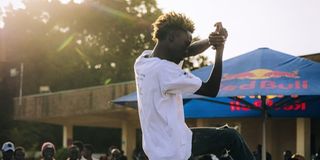Wilson Muhanji: 'I gave up a military job for dance'

Wilson Muhanji commonly known as Jaydenthedopebwoy during the red bull dance competition.
From discovering dance at the age of seven to performing on stages across Africa, Nakuru-born dancer Wilson Muhanji, commonly known as Jayden the dopebwoy, has seen it all.
Muhanji recalls that his love for dance began early, despite growing up in a family deeply invested in sports. While he played football like everyone else at home, he found joy and self-expression in dance.
“I was a quiet child, but whenever I danced, I felt happy and understood,” he shares.
His mother became the first person to support him in dancing, offering guidance and encouraging him even as he started performing at hotels, school events, and competitions in his early years.
In high school, Muhanji joined dance groups such as Favoured Dance Group and Wicked Dance Group before eventually pursuing solo performances.
His talent soon brought him national recognition, including reaching the regional finals of the Talanta Mtaani competition and participating in major events like the Red Bull Dance Your Style series.
His recent acceptance into the Sarakasi Dance Group marked yet another milestone in his evolving career.

Wilson Muhanji commonly known as Jaydenthedopebwoy poses for a photo during an interview with Mtaa Wangu.
“After completing high school, I did not pursue university studies immediately, choosing instead to acquire professional training through dance-related programs in business and communication,” Muhanji says.
This decision created tension at home, particularly with his father.
He shares that the turning point came when he skipped his military reporting date to attend the Red Bull finals, leading to his father disowning him.
“It was difficult, but I knew dance was my calling. My mother remains supportive while still encouraging me to pursue my passion,” Muhanji explains.
Muhanji’s advice to young aspiring dancers is grounded in experience. He encourages them to stay prayerful, seek mentorship, remain disciplined, and avoid negative influences.
“Looking ahead, I envision becoming one of the biggest dance brands in Africa and establishing my own company to create opportunities for other young creatives,” he says proudly.
At the same time, Muhanji acknowledges that dancers in Nakuru face significant barriers including limited opportunities and gatekeeping within the industry.
"To navigate these challenges, I stay informed, continue networking, and position myself strategically for growth," he notes
His persistence has led him beyond Kenya’s borders through cultural exchange programs in Tanzania, Zambia, Botswana, and South Africa.
A graduate of Sarakasi Talanta na Amani, Muhanji has more than 15 years of experience.
He has emerged as a professional dancer, choreographer, and instructor specializing in contemporary hip hop while remaining versatile in Afro, breakdance, krump, and traditional African dance styles.
Beyond stage performances, Muhanji has led workshops in schools and community spaces, teaching thousands of children and young adults to view dance as not only a career path but also a channel for healing, confidence, and self-expression.
He is also an advocate for mental health and social justice, using movement-based storytelling to address issues such as Gender-Based Violence.
"Through the advocacy journey I have earned recognition and awards, where I have won in the Saying No to GBV Through Art competition," he notes
Today, Muhanji stands as both an artist and a cultural ambassador, using his talents to advocate for social change while shaping the next generation of performers.


